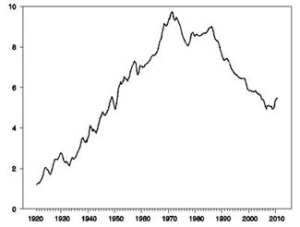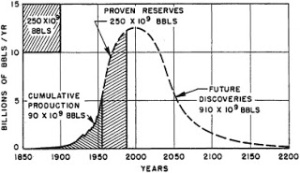Reposted from my blog Integral Permaculture.
Here’s an extended quote from this week’s Archdruid Report by John Michael Greer. Worth reading in its entirety, but this section succinctly addresses the 'peak oil theory is dead' meme currently circulating in the mainstream media.
…Over the last six weeks or so, I’ve fielded emails and comments from many sources insisting that peak oil has been disproved conclusively by the recent fracking phenomenon. This is hardly a new theme—in recent months, the same claims have been repeated almost daily at earsplitting volume in the mass media—but there’s a difference of some importance. The people who are sending these claims my way aren’t trying to claim that everything’s fine and the future of perpetual progress promised us by our culture’s most cherished mythology is on its way. No, they’re insisting that because peak oil has been disproved, I and other peak oil writers and bloggers need to get with the program, stop talking about peak oil, and start talking about the imminent threat of climate change instead.It’s a curious claim, all things considered. For well over a decade now, predictions based on peak oil have proven far more accurate than predictions based on the conventional wisdom that insists resource limits don’t matter. A decade ago, cornucopian theorist Daniel Yergin was loudly proclaiming that the price of oil had reached a permanent plateau at $38 a barrel, smart money was flooding into exciting new ethanol and biodiesel startups, and everyone other than a few peak oil writers out there on the fringes assumed as a matter of course that the market would provide, ahem, limitless supplies of energy from alternative sources if the price of oil ever did rise to the unthinkable level of $60 a barrel.Meanwhile, those peak oil writers out there on the fringe were garnering almost universal denunciation by predicting a difficult future of triple-digit oil prices, spiraling economic dysfunction, and the failure of alternative energy technologies to provide more than a very modest fraction of the vast energetic largesse our society currently gets from fossil fuels. The conventional wisdom was that this couldn’t possibly happen. A decade on, it’s not exactly hard to see who was right.As for the claim that the fracking phenomenon has disproved peak oil, it’s worth revisiting two graphs I’ve posted before. The first one tracks oil production in the United States between 1920 and 2012:See the little bitty uptick over on the right hand side of the graph? That’s the vast new outpouring of crude oil made possible by fracking technology. That’s what all the shouting and handwaving are about. I’d encourage my readers to take a long hard look at that very modest upward blip, and then turn to the second graph, which should also be familiar:This is the diagram of peak oil from M. King Hubbert’s original 1956 paper on the subject. Those of my readers who are paying attention will already have noticed the very large area on the right hand side of the curve, more than two and a half times the size of all cumulative production and proven reserves shown, labeled “future discoveries.” The Bakken shale? It’s included in there, along with many other oil fields that haven’t even been found yet.The current fracking phenomenon, in other words, doesn’t disprove peak oil theory. It was predicted by peak oil theory. As the price of oil rises, petroleum reserves that weren’t economical to produce when the price was lower get brought into production, and efforts to find new petroleum reserves go into overdrive; that’s all part of the theory. Since oil fields found earlier are depleting all the while, in turn, the rush to discover and produce new fields doesn’t boost overall petroleum production more than a little, or for more than a short time; the role of these new additions to productive capacity is simply to stretch out the curve, yielding the long tail of declining production Hubbert showed in his graph, and preventing the end of the age of oil from turning into the sort of sudden apocalyptic collapse imagined by one end of the conventional wisdom.Pick up any decent book on peak oil, or spend ten minutes of independent research on the internet, and you can learn all of this. Somehow, though, the pundits whose heated denunciations of peak oil theory show up in the mainstream media nearly every day don’t manage to mention any of these points. It’s not the only noticeable gap in their reasoning, either: I’ve long since lost track of the number of times I’ve seen media stories insist with a straight face that kerogen shales like the Green River formation are the same as oil shales like the Bakken, say, or duck the entire issue of depletion rates of fracked wells, or engage in other bits of evasion and misstatement that make our predicament look a great deal less challenging than it actually is…
Comment
© 2025 Created by David MacLeod.
Powered by
![]()


You need to be a member of Transition Whatcom to add comments!
Join Transition Whatcom